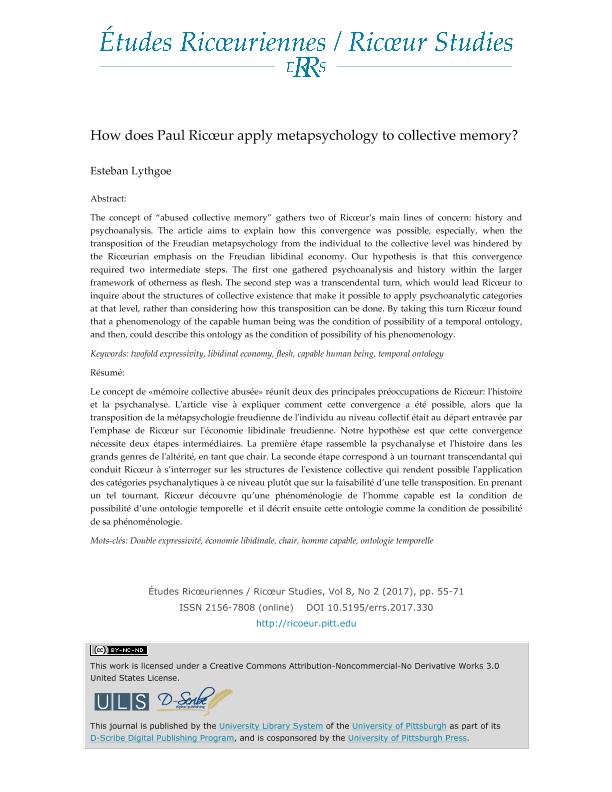Mostrar el registro sencillo del ítem
dc.contributor.author
Lythgoe, Esteban

dc.date.available
2019-04-23T15:09:03Z
dc.date.issued
2018-02
dc.identifier.citation
Lythgoe, Esteban; How does Paul Ricoeur apply metapsychology to collective memory?; University of Pittsburgh; Études Ricoeuriennes / Ricoeur Studies; 8; 2; 2-2018; 55-71
dc.identifier.issn
2156-7808
dc.identifier.uri
http://hdl.handle.net/11336/74784
dc.description.abstract
The concept of “abused collective memory” gathers two of Ricœur’s main lines of concern: history and psychoanalysis. The article aims to explain how this convergence was possible, especially, when the transposition of the Freudian metapsychology from the individual to the collective level was hindered by the Ricœurian emphasis on the Freudian libidinal economy. Our hypothesis is that this convergence required two intermediate steps. The first one gathered psychoanalysis and history within the larger framework of otherness as flesh. The second step was a transcendental turn, which would lead Ricœur to inquire about the structures of collective existence that make it possible to apply psychoanalytic categories at that level, rather than considering how this transposition can be done. By taking this turn Ricœur found that a phenomenology of the capable human being was the condition of possibility of a temporal ontology, and then, could describe this ontology as the condition of possibility of his phenomenology.
dc.description.abstract
Le concept de «mémoire collective abusée» réunit deux des principales préoccupations de Ricœur: l'histoire et la psychanalyse. L'article vise à expliquer comment cette convergence a été possible, alors que la transposition de la métapsychologie freudienne de l'individu au niveau collectif était au départ entravée par l'emphase de Ricœur sur l'économie libidinale freudienne. Notre hypothèse est que cette convergence nécessite deux étapes intermédiaires. La première étape rassemble la psychanalyse et l'histoire dans les grands genres de l'altérité, en tant que chair. La seconde étape correspond à un tournant transcendantal qui conduit Ricœur à s’interroger sur les structures de l'existence collective qui rendent possible l'application des catégories psychanalytiques à ce niveau plutôt que sur la faisabilité d’une telle transposition. En prenant un tel tournant, Ricœur découvre qu’une phénoménologie de l’homme capable est la condition de possibilité d’une ontologie temporelle et il décrit ensuite cette ontologie comme la condition de possibilité de sa phénoménologie.
dc.format
application/pdf
dc.language.iso
eng
dc.publisher
University of Pittsburgh
dc.rights
info:eu-repo/semantics/openAccess
dc.rights.uri
https://creativecommons.org/licenses/by-nc-sa/2.5/ar/
dc.subject
Twofold Expressivity
dc.subject
Libidinal Economy
dc.subject
Capable Human Being
dc.subject
Temporal Ontology
dc.subject.classification
Estudios Religiosos

dc.subject.classification
Filosofía, Ética y Religión

dc.subject.classification
HUMANIDADES

dc.title
How does Paul Ricoeur apply metapsychology to collective memory?
dc.type
info:eu-repo/semantics/article
dc.type
info:ar-repo/semantics/artículo
dc.type
info:eu-repo/semantics/publishedVersion
dc.date.updated
2019-04-16T13:18:10Z
dc.journal.volume
8
dc.journal.number
2
dc.journal.pagination
55-71
dc.journal.pais
Estados Unidos

dc.journal.ciudad
Pittsburgh
dc.description.fil
Fil: Lythgoe, Esteban. Consejo Nacional de Investigaciones Científicas y Técnicas; Argentina
dc.journal.title
Études Ricoeuriennes / Ricoeur Studies
dc.relation.alternativeid
info:eu-repo/semantics/altIdentifier/url/http://ricoeur.pitt.edu/ojs/index.php/ricoeur/article/view/330
dc.relation.alternativeid
info:eu-repo/semantics/altIdentifier/doi/https://doi.org/10.5195/errs.2017.330
Archivos asociados
